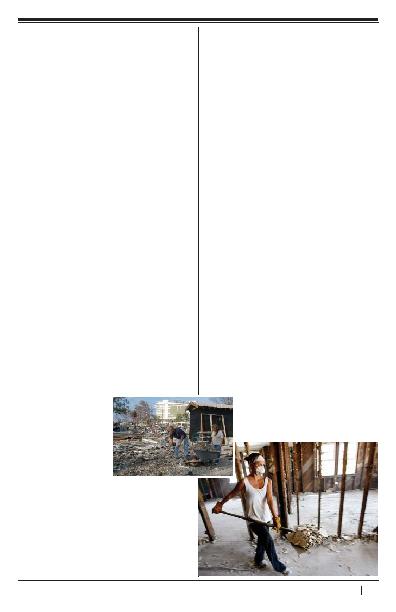
C L
.
21
living in the shelters unafraid." Redfern chuckled.
He said one of those feisty grandmothers
at the shelter whispered in his ear. "I'm not
afraid. Don't tell the white folks, but I've got
my pistol right here." She opened her purse
for him to see. She was living at the senior
citizen shelter that had been set up in Greater
St. John AME Church that was later "adopted"
by Bethel AME Church in Columbia, South
Carolina. I guess she was keeping it a secret
from them too.
Redfern continued. He started to talk about
Richard, a homeless man who had been living
at the Loaves and Fishes Homeless Shelter in
Biloxi just a few blocks from the oceanfront.
e night of the hurricane, Richard decided to
ride out the storm at the shelter. He had done
it before and it had turned out all right in the
past. is shouldn't be any di erent, or so he
thought. To his horror, he found out that this
would be di erent.
Within ve minutes after the rains started
coming, he was up to his waist in water inside
the shelter. He tried to open the door to get out,
but the door was frozen shut by the pressure of
the water on the outside. He broke the window
hoping to get out, but the water was coming in
so fast that he could not get out through the win-
dow. It was only until the water was higher than
the window that he could swim out. When he
was able at last to get out of the shelter, the rain
was driving down in torrents so that he could
hardly see, the water current was so strong that
he could hardly swim, and the wind was blowing
so hard that he was almost blown away.
While Richard was trying to nd some-
thing to cling to, he
saw a man on a rooftop
next to him blown away
by the winds. Richard
struggled to get on the
roof. A ve-gallon pail
oated beside him and
he snatched the pail to
use as a otation device
until he could make his way to the rooftop. Fi-
nally, he was able to get on the roof, but had
to lie down in order to keep from being blown
o . Twice, the wind blew him o the roof, but
he eventually was able to get to a third roof
and hold on for hours until the water receded.
When the waters receded, everything inside
the shelter had been washed away stoves,
pots and pans, furniture, everything. It was the
same story with the church across the street. It
was the same story within a six to eight block
area, but Richard was still alive. He had sur-
vived Hurricane Katrina and would live to see
another storm the storm of God's love that
was coming his way.
It's amazing whom God chooses to get His
message of hope to the world. Just a day or
two after Hurricane Katrina, I received a phone
call from Rev. Jimmy Jones, Founder of Christ
Central Ministries, a poverty mission ministry.
He called to let me know that he was going
to Biloxi, Mississippi to set up feeding stations
and a Kids Kamp for the survivors of Katrina.
I heard Jimmy's voice, "Gladys, does my
partner want to go to Biloxi with me?"
He was referring to me, of course. Christ
Central Ministries and City Light had been
partners in compassionate care to the commu-
nity for years.
I said, "I'm sorry, Jimmy. I can't go because
Joe needs me at the furniture store, but what
can I do to help you?" I think he already knew
that I would have to help my husband in the
furniture store, but he continued with con-
dence that I would help him in his mission
to help the survivors of Katrina. He continued
with his request, "If City Light can coordinate
church volunteer teams to come down every
week, that would be a big help."
I found myself saying, " at's an easy re-
quest, Jimmy. I'll get on it right away."
Joe and I were part of a group of people
that founded City Light in 1996 to bring Dr.
Tony Evans, an African-American preacher, to
Columbia for a three-day crusade at Williams-
Brice Stadium, University of South
Carolina's football stadium. e pur-
pose was to bring people of God to-
gether in unity to lift up Christ in the
city for evangelism and discipleship.

